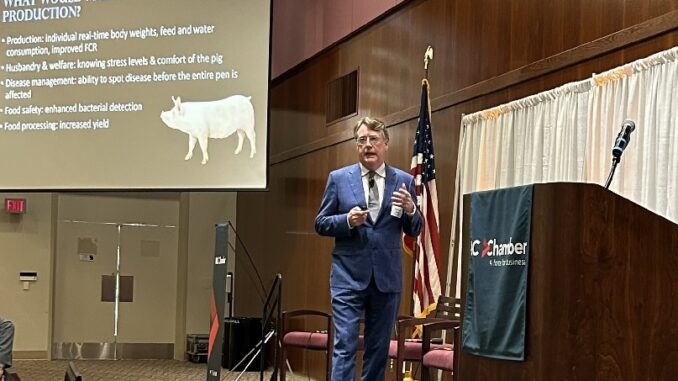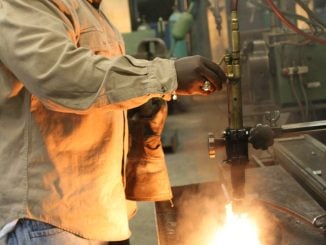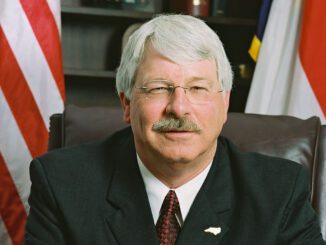
RALEIGH — Hot topics in agriculture from trade to technology were discussed at the North Carolina Chamber of Commerce’s “Ag Allies” conference held on Oct. 3 at the McKimmon Center on the North Carolina State University Campus.
Sessions at the event included Women in Ag Breakfast, Global Economic Outlook for Ag, a Future of Food Panel, and International Trade Issues.
The Keynote Presentation, “Ag of the Future,” was delivered by Aidan Connolly the president of Agritech Capital. Connolly resides in Wilmington, North Carolina, but is a native of Ireland and has lived in France.
Connolly shared his vision of what he calls “agri-food in evolution,” with a focus on the need for integrating data-driven technologies in farming, including everything from tablets, robots, ChatGPT, and AI as well as blockchain to 3D printing, to aid the increasing demand for food products.
“There are, however, today 570 million farms. So the question that always comes up is, “How are we going to feed people” with 70% more demand for food and 70% more demand for protein,” said Connolly. “And some people think that won’t come from animals.”
Connolly drew comparisons to the technological innovations in health care and medicine which have helped that industry leapfrog into the future. He said that crop production industries were at least 10 years behind the medical industry and livestock at least 20 years behind despite efforts to bring broadband and internet access to rural farming communities.
“But the realities are that we need these technologies to succeed, and we need to think about how we help those technologies succeed,” said Connolly, urging those in the agriculture sector to embrace the need for technology.
“So, the connectivity issues are global issues and, for whatever reasons, we’ve obviously put farms in rural areas – far away from towns and cities, and therefore not generally connected.” Connolly said when asked by North State Journal to expand on the issues with broadband and internet connectivity in rural areas. He added that new systems coming out such as Elon Musk’s Starlink could be helpful solutions.
Michael Swanson, Ph.D., Chief Agricultural Economist for Wells Fargo discussed various trends in consumption, spending, and inflation during his session on the global outlook for agriculture. Swanson noted that food inflation was generally good for the food industry over the past few years but warned that trend could reverse itself in the coming years and could “go negative.”
Swanson also discussed the biofuels sector, which ethanol currently dominates mainly due to mandates at the gas pump. He also said North Carolina is unique in that the state offers a wide variety of crops and livestock versus that of other states with concentrations in corn and soy production.
Cultivated or lab-grown meat and associated technologies were feature topics of the Future of Food panel featuring Gustavo Burger, CEO of Believer Meats; Clare Doyle, CEO of Verdesian; Liz Koutsos, president of EnviroFlight; and moderated by Bill Aimutis, the executive director for Food Innovation Lab.
Later in the conference, International Trade took centerstage in a presentation by Sharon Bomer Lauritsen, a consultant with AgTrade Strategies, LLC, and Ray Starling, the general counsel and president of the Legal Institute, NC Chamber. Discussion included challenges presented by China and Russia, as well as non-tariff trade barriers inhibiting progress towards a “rule-based international trading order.”



